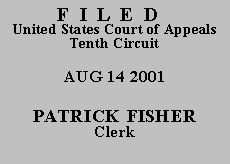

| UNITED STATES OF AMERICA,
Plaintiff-Appellee, |
|
| v. | |
| ALONZO KAVEN STEWART,
Defendant-Appellant. |
|
Alonzo Kaven Stewart, a federal prisoner proceeding pro se, requests a certificate of appealability to appeal the denial of his 28 U.S.C. § 2255 habeas petition. We deny a certificate of appealability and dismiss the appeal.
Stewart was convicted of one count of possession of a firearm by a felon, in violation of 18 U.S.C. §§ 922(g)(1), 924(a)(1), and was sentenced to 100 months' imprisonment, 3 years' supervised release, a $2,000 fine, and a $50 special assessment. On direct appeal, he raised only one issue: "whether his right to a fair trial was violated by improper remarks in the prosecutor's closing argument and the district court failure to give a curative instruction." See United States v. Stewart, No. 95-5028, 1996 WL 167544 *1 (10th Cir. Apr. 10, 1996). We concluded that "the statement was not so unfairly prejudicial that the trial judge and prosecutor were derelict in countenancing it," and affirmed the conviction. Id. at *2.
On September 22, 2000, Stewart filed a motion pursuant to Federal Rule of Criminal Procedure 12(b)(2) to dismiss the indictment for lack of jurisdiction. ROA, Doc. 31. He first argued that "he [was] convicted and sentenced to a crime that has no penalty." Id. at 4. He also alleged the indictment was insufficient under Apprendi v. New Jersey, 530 U.S. 466 (2000), because his prior felonies were not alleged in the indictment. He further argued he could raise Apprendi because it met the requirements of Teague v. Lane, 489 U.S. 288 (1989).
The district court held that under United States v. Hurd, No. 98-7129, 1999 WL 285921 (10th Cir. May 7, 1999), Stewart could not bring his claims as a motion under Federal Rule of Criminal Procedure 12(b) and construed the motion as a 28 U.S.C. § 2255 petition. The court found that as a § 2255 petition, the filing was governed by the AEDPA and was untimely because Apprendi "does not apply retroactively to an initial habeas corpus petition." ROA, Doc. 34 at 4.
When the district court denies a habeas petition on procedural grounds without reaching an underlying constitutional claim, a certificate of appealability should issue when the prisoner shows jurists of reason would find it debatable whether the petition states a valid claim of the denial of a constitutional right and whether the district court was correct in its ruling. Slack v. McDaniel, 120 S. Ct. 1595, 1604 (2000).
At the outset, we note that Stewart brought his challenge under Federal Rule of Criminal Procedure 12(b)(2). "Pursuant to Fed. R. Crim. P. 12(b)(2), a defendant's objection that the indictment fails to charge an offense shall be noticed by the court at any time during the pendency of the proceedings." United States v. Gama-Bastidas, 222 F.3d 779, 785 (10th Cir. 2000) (internal quotation omitted). Although arguably implicit in the language "during the pendency of the proceedings," we find no authority for permitting the filing of such a motion after the judgment and sentence have been entered. We treat the motion as a 28 U.S.C. § 2255 petition.
In his application for a certificate of appealability, Stewart sets forth only Apprendi-related issues. Stewart was sentenced below the statutory maximum for the crime for which he was convicted and Apprendi is not implicated. See United States v. Heckard, 238 F.3d 1222, 1235 (10th Cir. 2001).
We DENY a certificate of appealability and DISMISS the appeal. The motion to proceed in forma pauperis on appeal is DENIED. The mandate shall issue forthwith.
Entered for the Court
Mary Beck Briscoe
Circuit Judge
*.This order and judgment is not binding precedent, except under the doctrines of law of the case, res judicata, and collateral estoppel. The court generally disfavors the citation of orders and judgments; nevertheless, an order and judgment may be cited under the terms and conditions of 10th Cir. R. 36.3.